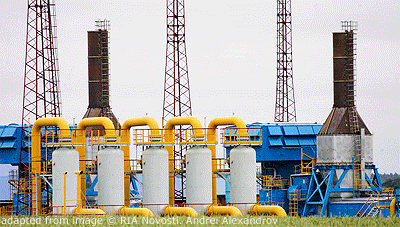Problems ahead for Gazprom
U.S. gas exports are set to start, but there are bigger threats to the monopoly's dominance

file photo By the end of the decade, increasing shale gas production could make the United States the world's largest exporter of liquefied natural gas, if 11 projects awaiting regulatory approval get the green light.
The presence of a new gas player will inevitably have an impact on global prices, including in the traditional markets of Russian gas monopoly Gazprom, but analysts doubted that the effect on the company, which accounts for 12.5 percent of Russia's total exports, would be immediate or significant.
Instead, more serious problems are threatening Gazprom's dominance of the European and domestic gas markets, taking small pieces out of its market share.
Minimal impact
Yulia Voitovich, oil and gas analyst at Investcafe research firm, noted that American gas should not be expected to compete with Russian gas directly, but increasing LNG production in the United States may lead to a drop in Russian exports anyway.
"Growing American production is leading to redistribution of gas supplies from exporting countries, such as Algeria, Qatar, Nigeria and Australia, as they are seeking new markets in Europe and the Asia-Pacific region," Voitovich said. "Gazprom already has to offer discounts on gas it supplies to Europe, and prices could further fall as competition grows stiffer."
Large-scale exports may not be on the cards for the United States, said Alexei Kokin, senior oil and gas analyst at Uralsib Capital, as the Federal Energy Regulatory Commission may decide that cheap gas could benefit the U.S. economy more if provided to domestic industries first.
An Asian outlet
Alexander Nazarov, senior oil and gas analyst at Gazprombank, believes that the effect of American exports will be felt primarily in Asian markets, where LNG prices are currently about seven times higher than in the United States, and demand is outpacing supply.
"Gazprom's position as the main gas supplier to Europe will not be jeopardized by American exports," Nazarov said.
All the same, Gazprom's dominance on the European market does not look secure, though for a different reason: the European Commission launched an antimonopoly investigation against the company last week.
Anti-monopoly fines in the EU can amount to 10 percent of annual revenues made in the country where violations have been exposed. Investcafe's Voitovich estimates that Gazprom thus risks fines of around $4 billion, and may have to revise its pricing policies for exports.
Spiraling problems
Dissatisfaction with Gazprom's high prices is pushing its European consumers to find other forms or sources of energy. For example, Ukraine Russia's largest importer is cooperating with China to partly replace natural gas with coal, Voitovich said.
A decline in demand has also raised questions about the relevance of Gazprom's ambitious South Stream pipeline to Southern and Central Europe, she said.
Uralsib's Kokin said that Poland and Lithuania are considering constructing an LNG import terminal. Ukraine's participation, meanwhile, is not ruled out.
But Gazprom faces even bigger problems on the home front, such as a 23 percent drop in profit in the first quarter and high operating costs at the troubled Shtokman field, which have forced it to postpone the high-profile project. A low likelihood of tax breaks means that it may be unable to pursue two other offshore projects aimed at the Asian-Pacific market, leading to an inability to make up for declining European demand.
"Given that the government is reluctant to cut taxes, Gazprom will not necessarily receive tax breaks in the near future, which will lead to further postponing the launch of its projects or to financial losses," Voitovich said.
The specter of Novatek
More fundamentally, Gazprom's domestic share of the market is declining. Production fell 2.5 percent between the first quarters of 2011 and 2012, year-on-year, while share of the country's biggest independent firm, Novatek, rose from 6.6 percent to 7.6 percent over the same period.
Novatek has also made strong purchases and agreements, becoming a monopoly in the Chelyabinsk region by taking over a regional Gazprom subsidiary late last year, and this summer signing deals with steelmaker MMK and German energy firm E.ON, a former Gazprom partner. The market is also anticipating the entry of a Rosneft-Itera joint venture over the next few years.
Gazprombank's Nazarov, however is optimistic about the monopoly's future.
"Gazprom will remain a market leader for decades to come," he said.

